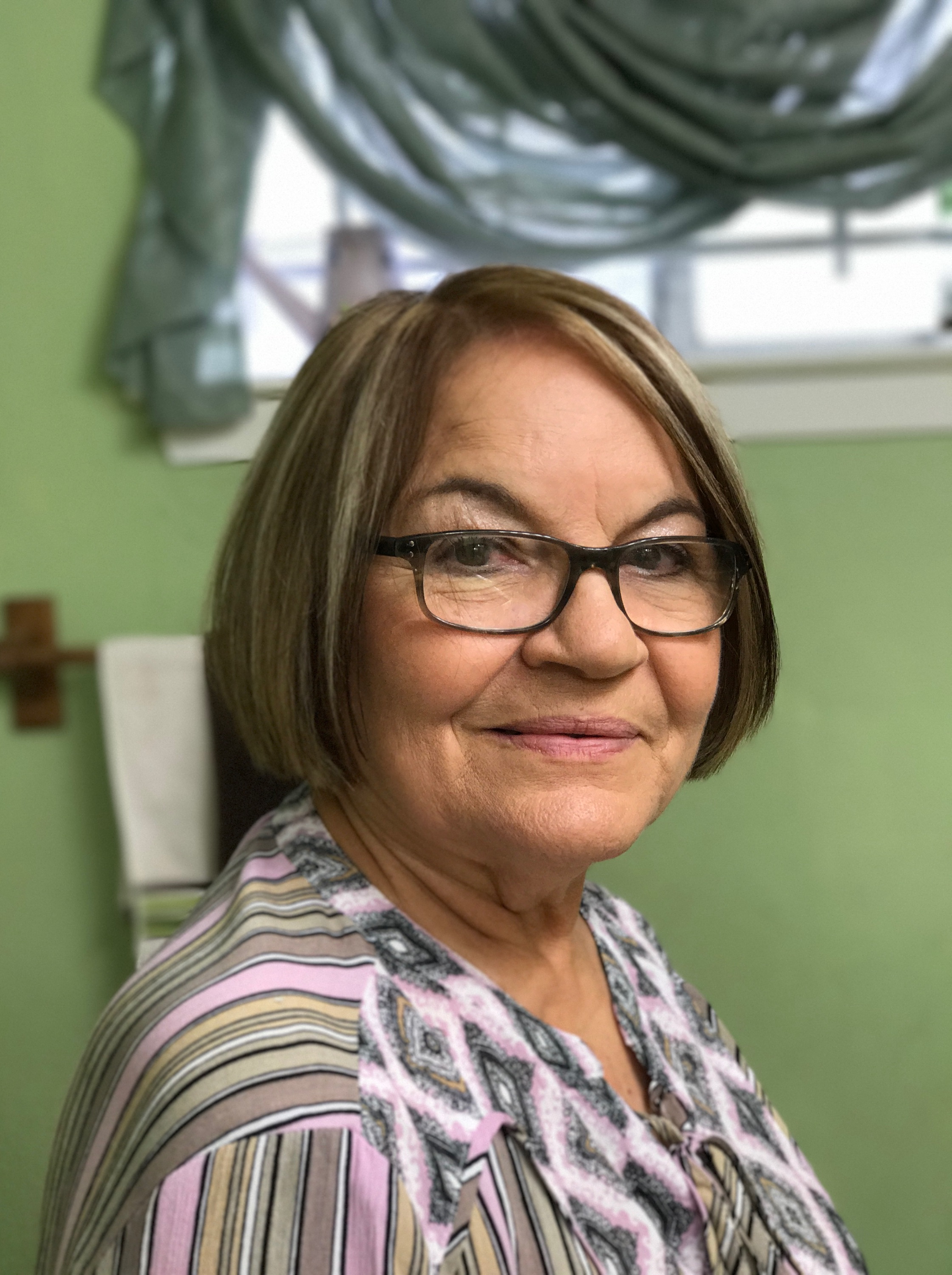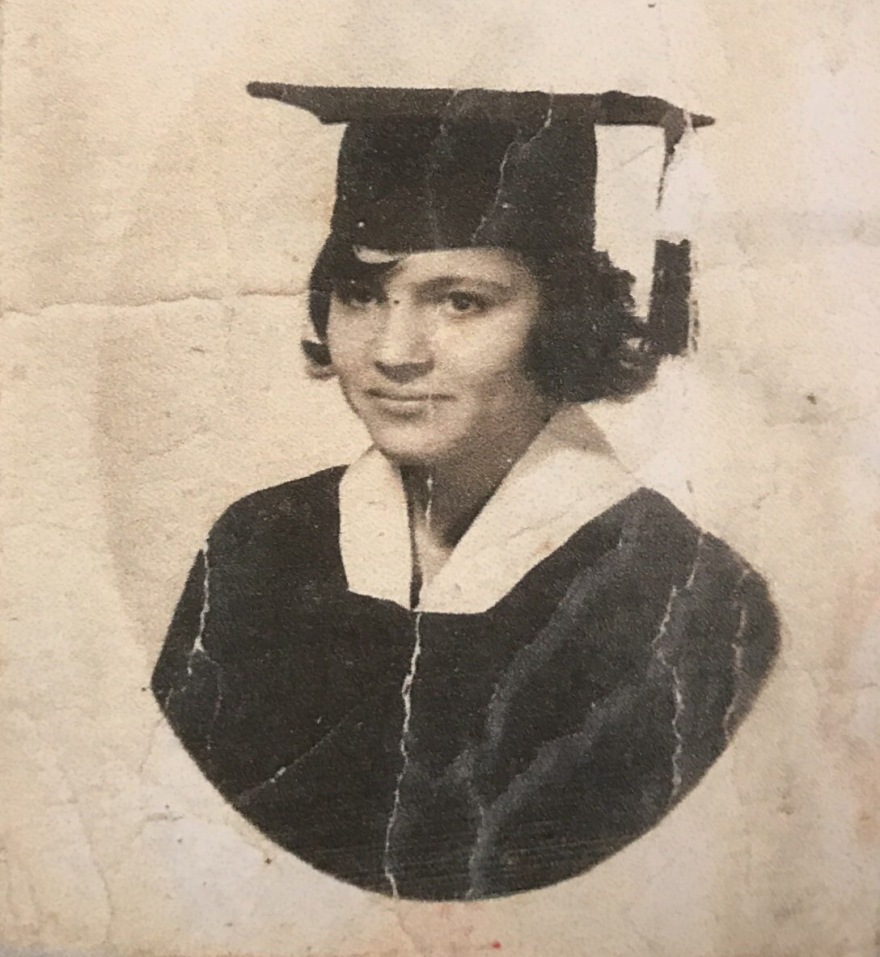
Delia Ortiz was born in 1945, and was raised in Ponce, Puerto Rico. Ortiz spent the first half of her life in Puerto Rico where she completed her schooling/degree, began her career as an accountant, and started a family. By 1989, Ortiz migrated into the United States in search for opportunity for both her children, and herself. Ortiz states that it was the move to Pasadena, Texas that affected her success she has had in her lifetime. “I think I am an example of the American dream…I had to earn my freedom, start from the bottom with nothing, face hardships, and work to get to where I am today,” (Ortiz) During her lifetime many influences have affected her ideology behind freedom. Some being historical events/ actions, and others personal. Through this online exhibit, the political and discrimination changes will be portrayed through her personal story.
Delia Ortiz, 71 years old, is an immigrant from Puerto Rico. She is the oldest of 12 siblings, and views her large family and upbringing as a blessing because of her learned morals. During the interview, topics over her experiences as an immigrant, her upbringing, her knowledge on American history, and her views of freedom were covered. Many interesting stories were shared, and an abundance of information was learned throughout the interview. Several of Ortiz’s memories are connected to the larger historical context of American events that were ongoing., although she is not well informed on the detail of the event.
For Ortiz, moving to the United States although life-altering, was very strenuous and raised many challenges. Speaking only Spanish, language soon became a one of the biggest barriers and left her feeling vulnerable to prejudices against her culture and herself. “I feel like I am limited by my accent…I’ve have been treated like if I don’t belong…Hispanics are generalized, and people place many Hispanics under the same category” Ortiz speaks about her experiences with discrimination in America. “I first came to learn about racism while in the united states and it is still present” (Ortiz). Ortiz claims one of the biggest struggles she faced was the process of getting a job. She felt as if she was lesser than other Americans, even though speaking fluent Spanish put her at an advantage in South Texas.

When asked the struggles she faced in such a large family, Ortiz said it was school. They had to walk several miles in groups to get to school; portraying the desire to become educated in her community. Ortiz even with the hardship, excelled through school, graduating early at 16. She said another struggle was the size of their home. Her home had 4-5 kids in each room due to the quantity of children. She went on to say that she did experienced gender roles when growing up. “…traditionally gendered family roles and hierarchies would lead to social crisis became persistent themes in mid-20th-century social work on the island.” (Suárez). Ortiz explained how her mother taught her how to cook for the family, clean the house, and even make clothes for the family from a young age. She talked about the roles women of her time and how they were expected to be housewives, while the men did the yardwork, and were not allowed to wash dishes, or clothes, or do the chores of the females.
One of the first American events Ortiz recalls was World War II. Ortiz said she distinctly remembers watching her mom crying at the news because of how much she feared her husband getting her hurt in the war, leaving her a single mom of 12. Ortiz says her family was very worried as they hoped with everything that their dad would return alive. WWII also played a part in how Ortiz acquired her job so quickly. “WWII mobilization led to a permanent increase in female employment. Using Census micro data we study the effects of this increase on the occupations women held after the war.” (Bellou) This rise is jobs allowed for Ortiz’s opportunity and success to strengthen.
Ortiz recalls the Vietnam war, and the emotional impact it had on her because she remembers the high casualty rate and family and friends passing away while in combat. She also was impacted by the drafting rate, and witnessed many family members being forced into the war. “By the time it ended, 58,000 Americans had been killed, along with 3 million to 4 million Vietnamese.” (Foner, 814) This death rate affected her because it was heartbreaking for Ortiz to witness family going into the war, and not all members surviving. “…The race and ethnicity of the citizen observer and the race or ethnicity of the casualty can interact to produce a set of relationships in which citizens are more sensitive to casualties from their own group and less sensitive to casualties of other groups.” (Gartner).
Ortiz remembers the assassination of John F. Kennedy. Ortiz says” he was one of my favorite presidents, and my school mate would say I look like Jaqueline Kennedy, his wife.” (Ortiz). Lastly, She said “the one event I will never forget is the 9/11 terrorist attack on the twin towers” (Ortiz). Ortiz was on the phone with her friend from New York when the friend began to scream as she could the explosion from her window. “September 11, enveloped the country in a cloud of fear. Americans’ Consciousness, and fear of terrorism powerfully affected their daily lives.” (Foner, 875). Ortiz recognizes the effect it had/has on our nation, and even says it is the reason she is terrified of traveling on planes. 9/11 is engraved into the history of the United States as the day when one of the most terrible disasters ever happened. For thousands of families it was and still remains a personal tragedy; yet, for all Americans it has turned into a national trauma. (Prorokova).
When Ortiz talked about freedom, she defined it briefly as “being able to do whatever you want without being forced.” Ortiz states, “freedom is also learning from one’s mistakes…we need to open our hearts for immigrants, and the world to expand freedom.” (Ortiz). Throughout her life she had faced struggles and hardship but has overcome those difficulties with strength. These events have made her the person she is proud to be today and is grateful for the family she has created. Ortiz is inspired by the opportunities that America gave her that Puerto Rico couldn’t during the time. She says has learned, “When it is raining, instead of complaining, I learned to work under the rain.” (Ortiz)
Works cited
Ortiz, Delia. Personal Interview. 26 March 2017.
Foner, E. (2014). Give Me Liberty! Fourth Edition (Fourth Edition ed.), pp. 814
Foner, E. (2014). Give Me Liberty! Fourth Edition (Fourth Edition ed.), pp. 875
Gartner, Scott Sigmund, and Gary M. Segura. “Race, Casualties, and Opinion in the VietnamWar.” Journal of Politics 62.1 (2000): 115. America: History & Life. Web. 21 Apr. 2017.https://manowar.tamucc.edu/login?url=http://search.ebscohost.com/login.aspx?direct=true&db=ahl&AN=3098976&site=ehost-live&scope=site
Suárez, Isabel Códova. “Setting Them Straight: Social Services, Youth, Sexuality, and Modernization in Postwar (WWII) Puerto Rico.” Centro Journal, vol. 19, no. 1,Spring2007, pp. 24-49. EBSCOhost,manowar.tamucc.edu/loginurl=http://search.ebscohost.com
/login.aspxdirect=true&db=ahl&AN=25930221&site=ehost-live&scope=site.
Bellou, Andriana and Emanuela Cardia. “Occupations After WWII: The Legacy of Rosie theRiveter.” Explorations in Economic History, vol. 62, Oct. 2016, pp. 124-142.EBSCOhost,https://manowar.tamucc.edu/loginurl=http://search.ebscohost.com/login.aspx?direct=true&db=ahl&AN=119779123&site=ehost-live&scope=site
Prorokova, Tatiana. “9/11 and the Visual Culture of Disaster.” Journal of Popular Culture, vol.48, no. 6, Dec. 2015, pp. 1400-1402. EBSCOhost,https://manowar.tamucc.edu/login?url=http://search.ebscohost.com/login.aspx?direct=true&db=ahl&AN=112337290&site=ehost-live&scope=site